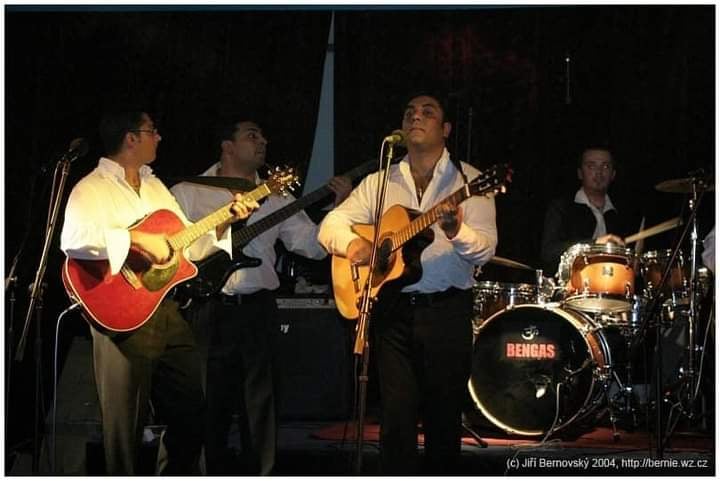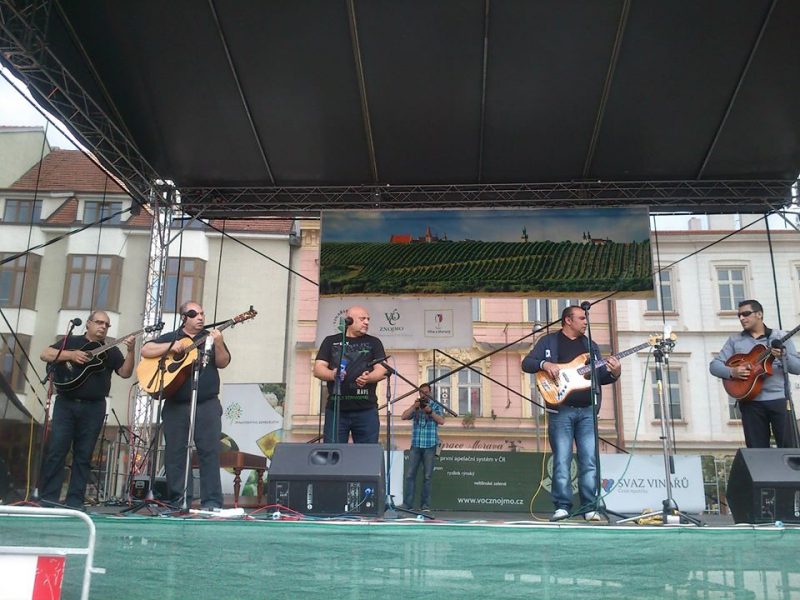
Roma music band Bengas. Photo by Jiří Bernovský, used with permission granted by Migel Milan Horvát.
While Roma people are the largest ethnic minority in Czechia, comprising about 2.2 percent of its population, they are considered one of the most stigmatized and discriminated minorities in the nation. But even with the discrimination and undue stereotypes, the Roma people continue to have a huge social impact and are extremely prominent in Czechia's music scene.
This author conversed with representatives of Czechia's Roma music community about the prejudge and discrimination they face, the latest news of Roma oppression, and the borderless nature of music.
Roma minority and their social exclusion
Anti-Roma discrimination was brought to the forefront last month after a Romany man was killed by the police on June 19. The death triggered a wave of turmoil and protests within the Roma community as some Roma media compared the conflict to the George Floyd murder in the United States. Although it was determined by forensic autopsy examination that the police were not responsible for the man's death, the case drew attention to tensions between the Czech majority and Roma national and ethnic minority.
These tensions are nothing new, particularly when it comes to Czechia's social and cultural dynamics. For instance, the Council of Europe (COE) recently noted, that many European school programs fail to acknowledge the Roma people in their curricula and many historical accounts related to the Roma are unobjective or incomplete and fall prey to stereotyping.
In its 2020 report, the COE recommended Czechia address the ongoing discrimination and prejudice against the Roma people by including their history in school textbooks and addressing the issue of propaganda and false information about Roma people on the internet and social media. They also warned Czechia regarding the lack of advancement on its Roma language programs, where elementary and high schools were supposed to offer Roma language classes. These initiatives are part of a 20-year plan to protect Roma people and Travellers and fight against racism, intolerance, and social exclusion.
Results of a June 2021 poll showed that 70 percent of respondents in Czechia expressed antipathy toward the Roma.
Roma musicians and their social inclusion

Roma music band Kale. Photo used with permission granted by Emil “Pupa” Miko.
Despite the unpopularity and social exclusion of Roma as people, prevailing public opinion considers them a very musical nation.
Migel Milan Horvát from the band Bengas explains:
We are six musicians. We have no problem with fusion, the whole family plays some instrument. We play not only Romani-Gypsy folklore, but also a lot of Latin music, Balkan music (Kusturica or Bregovič), Russian Gypsy music, Polish songs, funk, soul, and of course such evergreens as Bésame Mucho.
Roma music is favorite among the general public, and world-famous Czech classical composers like Karel Bendl or Antonín Dvořák often included Roma melodies in their work. In recent years, Roma music can be found on almost every radio station, due to the popularity of the French Gypsy Kings or Czech-US band N.O.H.A., which are famous for their Roma-Latin style.
In the Czech pop music scene, there are a solid number of musicians of Roma origin, but they mostly sing mainstream melodies.
Horvát explains:
Czechs are a rock nation. Chinaski, Kabát — these are the leading Czech musicians, which is listened to by almost every Czech. Jan Bendig, musician of Roma origin, is probably the only one who has established himself out of many Roma people.
Emil “Pupa” Miko, a Roma musician and long-term member of the bands Věra Bílá and Kale disagrees:
…on the Czech scene you can hear and see musicians of Roma origin, but they do not sing Roma music, but they rather are musically assimilated with Czech music or taste.
While live festivals throughout the country often feature Roma or Gypsy musicians, they are not included in many mainstream media channels.
Miko reflected on the issue:
We have been officially playing since 1996, when we released our first CD. Since then, we have played not only in the Czech Republic but also abroad, we have toured 36-37 countries. We play our universal music, it's Roma music, positive, dance, that everyone likes.
Czechs perceive our songs positively, they even sing our songs along with us in our concerts…
However, when we tried to promote our music on radio, even through commercial channels, they refused to play “black music”, due the fear of losing their listeners… In fact, since then did not changed much, they play old songs, for example of Antonin Gondola, or our old songs only if there is some “great” occasion.
Horvát expressed similar opinion:
The Roma are a musical nation, we have a musical tradition for centuries… Our group is called Bengas, translated from Romani as “devils”, since we play such energetic things and as fast as devils…
Czech people invite us a lot, but privately, to their celebrations. We also play a lot at festivals. The Czechs like the way we play, it won't take even 5 minutes before someone dances. Although, we are called as the “band on which you dance”, however, on the Czech market, in larger scale it is hard to get, and I know it is on the basis of the nationality. Couple of times we were giving an interview to the Czech TV and radio, but none released our music, and they didn't want to promote us in any way…
Both address the issue of such phenomenon as Gypsy World Music, noting that the recent peak of acceptance and recognition of Roma music in Czechia was around 2004, which was connected with the world-famous band Gypsy Kings visit the country.
Horvát recalled that his band performed as the opening act on the Gypsy Kings concert in the T-Mobile arena in Prague:
We also travel a lot in Europe. There are only 4–5 of us such Roma bands that travel around Europe. We lived in France for a while. Although, we try to avoid the negative thoughts, but when we compare the attitude, in Czechia, at the official level, there is a different relationship with the Roma than, for example, in France or even in neighboring Slovakia. Privately, Czechs, individuals, love us. But political discourse does not always benefit society.
While both musicians shared largely positive experiences of acceptance by the Czech people individually, they both agree that on a wider level discrimination exists, including media discrimination, prejudices, and difficulty finding housing for themselves or work for relatives.
When asked what Roma musicians need to gain to have equality in Czechia, Emil “Pupa” Miko replied:
I think it would take time to change that mood, the mentality and the way people with different skin colors are perceived, as it is in the USA now.
Migel Milan Horvát concluded:
I believe, the future is in the hands of children… What I am most interested in, when we play, is the reactions of the children. If the child is interested in something, it is immediately recognizable. Adults can lie, but children will not. I know that. We played for over 10 years in orphanages. Plus, we're all in the band around 50 years old now. It is important to stay positive, and Roma music is positive.







1 comment
Good day, Elmira Lyapina.
I’m Mitsuo Sugano, co-editor of Global Voices Lenuga Japanese.
One of our members translated your articled, “Roma musicians discuss inclusion in larger Czech community” recently.
We got feedback from a Japanese resident in Czech, who also knows this case and wants to hear why the article says the man was killed by the police though the Czech courts ruled that the police were not responsible for the man’s death as you wrote in the article.
As we have earnest readers on articles of middle and eastern Europe and sometimes receive comments from readers, we’d like to feedback your reply and idea to them, if possible.
Thank you!
Mitsuo/